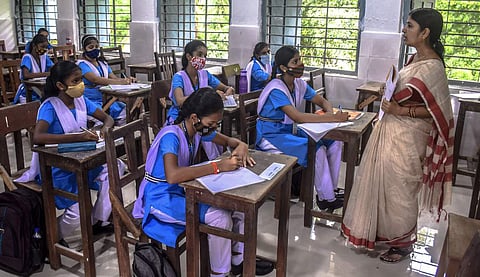

A majority of their students are first-generation learners and come from very difficult backgrounds; poverty, alcoholic parents, broken families, violence, abuse and sickness at home. If students are absent from school, teachers of government schools visit their homes to find out the reason behind their absence, counsel them and their parents to ensure that they attend school, but it is a job easier said than done.
On the eve of Teachers' Day, The New Indian Express spoke to a few teachers in government schools in Karnataka, who, on condition of anonymity, shared the sordid reality of their students and the challenges teachers face in ensuring that the students attend the school. They admit that the government has made sound provisions like free education, textbooks, uniforms, mid-day meals and so on but in the face of adversities, it's a difficult choice for children to attend school.
The teachers admitted that some of their colleagues resort to corporal punishment out of frustration or reasons known to them as a measure to "instill fear to teach" their students. "We know that punishing a child is an offence and we try our best to motivate this category of children to study and improve their future but it's tough. They have no role models. We have to face the ire of the parents, who don't want their children to go to school and the government officers on the other hand, who question and hold us responsible for non performance of students," said a teacher.
"Many students leave their text books behind in the school out of fear that their parents may destroy/burn them because they would rather have them work and contribute to family income or attend to chores at home than go to school to study," said a teacher of a government high school.
"Parents are uneducated and they don't understand why their children have to go to school. Children pay a heavy price for coming to school. They go back and face violence, alcoholism, physical and verbal abuse and forced labour at home. They are made to do household chores and are beaten up if they open their books. Children return to school with incomplete homework," said another teacher.
She quoted an incident when, during a visit to a dropout's home, she found that the father of the child was an alcoholic and had dirtied the small room in which they lived. "He refused to go to the washroom and had eased himself in the room. He and his wife are alcoholics. I wept for the girl, who stood helpless in front of me," said the teacher.
It is not uncommon to see poor turnout of parents for parent-teacher meetings (PTMs) in government schools. "Both parents are either working or are least interested in their children's education to attend PTMs. Teaching is not easy and teaching children from difficult backgrounds is a real challenge. If some students do well we all celebrate but every government school teacher desires to have nil dropouts in their class. Our job is unfinished even if one child is out of school," said the teachers.
